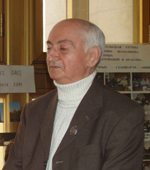|
 In Moscow, they said good-bye to the legendary scientist Sevyan Vainshtein. The heart of the inquisitive ethnographer, remarkable researcher and expert on Tuva, stopped in the morning of October 16. In Moscow, they said good-bye to the legendary scientist Sevyan Vainshtein. The heart of the inquisitive ethnographer, remarkable researcher and expert on Tuva, stopped in the morning of October 16. In 2006, the scientist’s 80th birthday was widely celebrated in the entire republic.
A graduate of Moscow State University, a native of Moscow, he left the comforts of the capital city and went to Tuva, which he researched over the course of almost half a century, in numerous field expeditions on foot, or riding reindeer, horses, and camels.
Based on the materials collected during his many years of ethnographic and archeologic expeditions, Vainshtein wrote many ground-breaking historico-ethnographic monographs about Tuvans, their origins and the genesis of their national culture (“Tuvintsy-todzhintsy”, M.,1961, “Istoriya narodnogo iskusstva Tuvy”, M.,1974, “Istoricheskaya etnografiya tuvintsev”, M.,1972, “Mir kochevnikov tsentra Azii”, M.,1991).
Sevyan Izrailevich did not have an easy fate. His father was repressed in 1936, and executed in 1938, therefore the young man was refused admission to university education, but nevertheless, finally was accepted at the MSU. Even as a student, in 1947, S.Vainshtein received an university Award for his scientific work “Religiosno-filosofskoye uchenie sekty izmailitov”.
He always distinguished himself by strong principles and humanitarian position. In 1948, in the framework of the expedition of Ethnographic institute of Academy of Sciences of the Soviet Union (now Institute of Ethnology and anthropology of Russian Academy of Sciences), under the leadership of B.O.Dolgikh, he conducted research of the Kets of Podkamennaya Tunguska. Shocked by the plight of this nation, after his return, he took numerous decisive measures to save this nation from extinction. He presented a memorandum on this theme to the department of Ethnography of MSU, and wrote a letter to G.M.Malenkov. “For denigration of the soviet national policies”, he was dismissed from Komsomol and from the university. However, the Committee of CK VKP corroborated the facts mentioned in S. Vainshtein’s letter to Malenkov. According to the findings of the Committee, new directives for measures to help the Kets were accepted. Vainshtein was re-instituted at the University, and in 1949, the Ethnographic Institute sent him on another expedition to the Kets.
He continued to work at the Institute of ethnology and Anthropology RAN. He was preparing for print his new book, a Russian language version of “Expeditions to the Center of Asia” (Geheimnisvolles Tuwa). His book of memoirs about his expeditions to Tuva was first published in 2005 in Germany, by the “Alouette Verlag” Publishing House.
|
|
